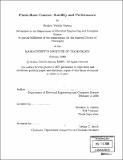Finite-rate control : stability and performance
Author(s)
Sarma, Sridevi Vedula
DownloadFull printable version (4.939Mb)
Other Contributors
Massachusetts Institute of Technology. Dept. of Electrical Engineering and Computer Science.
Advisor
Munther A. Dahleh.
Terms of use
Metadata
Show full item recordAbstract
The classical control paradigm addressed problems where communication between one plant and one controller is essentially perfect, and both have either discrete or continuous dynamics. Today, new problems in control over networks are emerging. A complex network involves an interconnection of numerous computational components where the controllers may be decentralized, and the components can have discrete or continuous dynamics. Communication links can be very noisy, induce delays, and have finite-rate constraints. Applications include remote navigation systems over the internet (eg. telesurgery) or in constrained environments (eg. deep sea/Mars exploration). These complexities demand that control be integrated with the protocols of communication to ensure stability and performance. Control over networks is recent and continues to receive growing interest. Initial work has focused on asymptotic stability under finite-rate feedback control, where the only excitation to the system is an unknown (but bounded) finite-dimensional initial condition vector. Such problems reduce to state-estimation under finite-rate constraints. (cont.) More recently, disturbance rejection limitations were derived for the same setting, assuming stochastic exogenous signals entering the system. Although these studies have contributed greatly to our understanding of such systems, input-output stability, performance analysis, and synthesis of coding schemes and controllers under finite-rate constraints remains largely untapped. In this thesis we address how finiterate control impacts input-output stability and performance, and we also construct computable methods for synthesizing controllers and coding schemes to meet control objectives. We first investigate how finite-rate feedback limits input-output stability and closed-loop performance. We assume that exogenous inputs belong to rich deterministic classes of signals, and perform analyses in a worst case setting. Since our results are derived using a robust control perspective, we are able to translate performance demands into optimization problems that can be solved to obtain quantization strategies and controllers in a streamlined manner. We then study how finite-rate feedforward control impacts finite-horizon tracking and navigation. (cont.) We derive performance limitations for each case, and illustrate time and performance tradeoffs. Finally, we investigate feedforward control over noisy discrete channels, and solve a decentralized distributed design problem involving the simultaneous synthesis of a block coding strategy and a single-input single-output linear time-invariant controller. We also illustrate delay versus accuracy tradeoffs.
Description
Thesis (Ph. D.)--Massachusetts Institute of Technology, Dept. of Electrical Engineering and Computer Science, 2006. Includes bibliographical references (leaves 88-91).
Date issued
2006Department
Massachusetts Institute of Technology. Department of Electrical Engineering and Computer SciencePublisher
Massachusetts Institute of Technology
Keywords
Electrical Engineering and Computer Science.